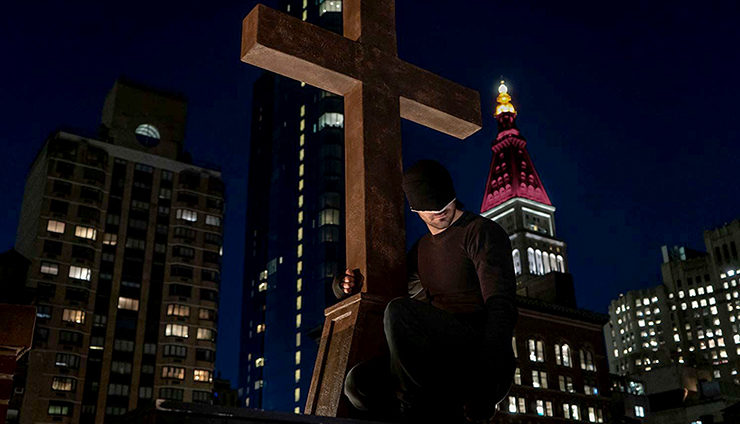I’m going to start off by saying that Daredevil season three is a masterpiece, and I desperately want a season four. I went into the new season worried that the magic had faded—Defenders was only okay, Daredevil season two had a lot of issues, and the recent cancellations of both Iron First and Luke Cage puts the Netflix corner of the MCU on shaky ground—but from the opening scenes the show had me hooked. Honestly, as far as a continuous piece of tightly-woven, cohesive storytelling, this might be even better than the first season of Jessica Jones. It also might be the first of the Marvel/Netflix shows that has earned its thirteen episode roster for me—while not every episode is perfect, I don’t think there’s a dud here, and if anything I think it could have used another hour.
So with that out of the way, on with the non-spoiler review!
Basic Plot Elements
Matt Murdock survived the collapse of Midland Circle, which even the rational Father Lantom calls a miracle. The first three episodes really lean into Matt’s spiritual journey, and the show trusts us to come with them as he slowly recovers, nursed by the nuns at his old orphanage—in particular Sister Maggie, who seems to take a special interest in him. Matt’s deaf in his right ear, his spine and hip are banged up, and he can’t smell anything. Since his senses are on the fritz he can’t really Daredevil yet. He refuses to call Karen and Foggy, he’s furious with God, he misses Elektra, and feels like everything he’s fought for has been for nothing. He’s decided that he’s going to keep fighting, but bleed only for himself, rather than trying to be God’s soldier.
Throughout his recovery, Sister Maggie supports him, snipes at him, yells at him, helps him practice boxing, and generally behaves like the Platonic Ideal of Nun-dom. She doesn’t take his shit, and as their own relationship complicates we can see that we’ve possibly gained a new Sister Confessor, essentially, to match Father Lantom. Who is also back, and AWESOME.
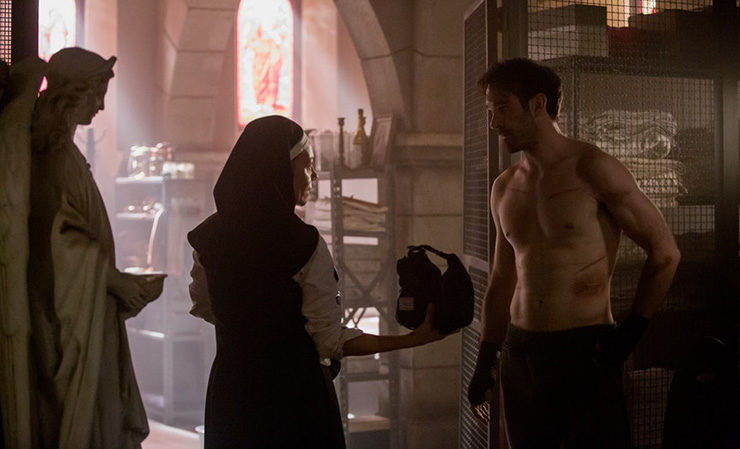
At some points Matt sounds like a whiny Recovering Catholic, [“You know what I realized? Job was a pussy.”] at others he sounds like a newly minted nihilist [“I’m Daredevil. Not even God can stop that now.”] but at all times the show takes his pain seriously, just not the way he wants us to. In some ways his relationship with God is the most important relationship in his life, and he feels like he’s been betrayed. He also, occasionally, feels like he’s the betrayer—there are at least two times when he nearly commits suicide. His constant internal monologue over whether or not to kill Wilson Fisk wraps around his anger with God in a way that gives both conversations more depth, and new angles. This is not simple a retread of Season One. Like most martyrs, there’s a fair amount of arrogance at work here, as well—Matt’s gone a bit beyond the freshman who’s come home an atheist for Christmas break, however. He thinks he’s seen God’s True Face, that of a vengeful despot who just wants to punish him. “In front of this God, I’d rather die as the Devil than live as Matt Murdock.”
Come to think of it, this God sounds kinda like Wilson Fisk.
Speaking of whom, Fisk works out a deal with the FBI to be released into the penthouse of a hotel on house arrest while he turns over evidence on various crime syndicates. Supposedly, this is all for Vanessa’s benefit, so she won’t be prosecuted as a conspirator… but it’s Fisk. The feds go for the deal, and the first thing Matt hears when his ears finally heal is the news of Fisk’s release. The clash between Matt and Fisk plays out in Matt’s ongoing internal monologue—he’s haunted by Fisk, who asks: “God returned your hearing just in time to hear my name chanted by the crowds. Just in time to learn in the long run, I won! You lost! Does that sound like God’s forgiveness?” and “Wouldn’t that be something? If I became more valuable to this city than you ever were?”
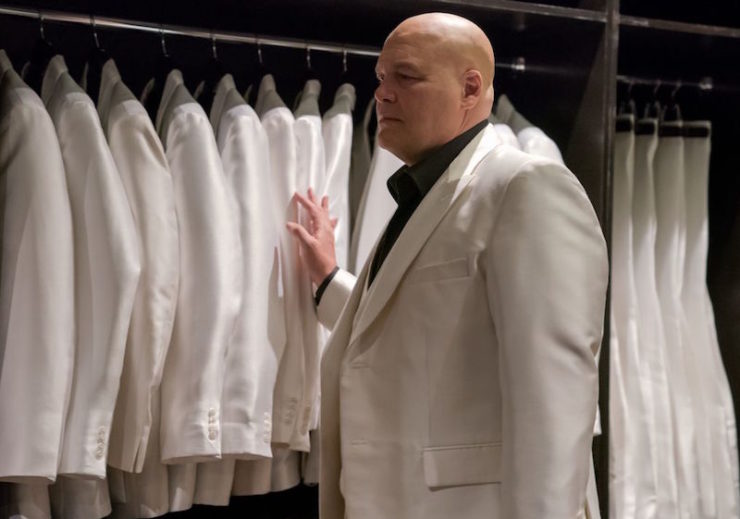
Matt loses again and again, beaten to a pulp. Karen tries a Matt-style sacrifice play only to be pulled back from the brink by Foggy Nelson. Foggy tries his own power move, only to be dragged back down by Fisk’s attack on his family. We see people’s morality chipped away because they’re financially compromised, they get bad loans, their healthcare is cut, they can’t offer middle class lives to their wives and children, their credit cards are declined. we see people who are morally screed because they cant get decent mental health care. We see people who are compromised because they can’t afford a decent education, and are mocked and derided by their families for forgetting their roots if they want to use their intelligence—as though intelligence is a liability.
The Catholic church is once again presented as an uncomplicated sanctuary, a place of ultimate Good that hold itself apart from the evil and corruption of Hell’s Kitchen. The orphanage that took Matt in raised him well, the nuns and priests loved him, and there’s never any hint of abuse. The Church takes Karen Page in without a second thought, and shields her from Fisk and Bullseye, despite her hostility to religion. Maggie is seemingly allowed free reign over part of the church, with never even a hint that as a woman she might not have the same level of power and freedom as Father Lantom. (There’s also never a hint that maybe the head of the diocese might show up and ask what the heck they’re doing with their time, since they’re having constant heart-to-hearts with Matt instead of preparing sermons or teaching CCD classes.) Likewise the NYPD are presented as good, self-sacrificing, salt of the Earth people (as opposed to those fatcats in the FBI) and are never implicated in anything like, say, unfair stop-and-frisk procedures. I don’t mean to sound snarky here, by the way, it actually made for a nice viewing experience to see that in the midst of sickening corruption, there were some institutions that tried to toe a moral line. I just also found it interesting that the showrunners and writers chose to balance their extremely progressive stances with reverence for a couple of more traditionally conservative institutions.
Superhero Action
But enough of this, I hear you saying! How is the action???
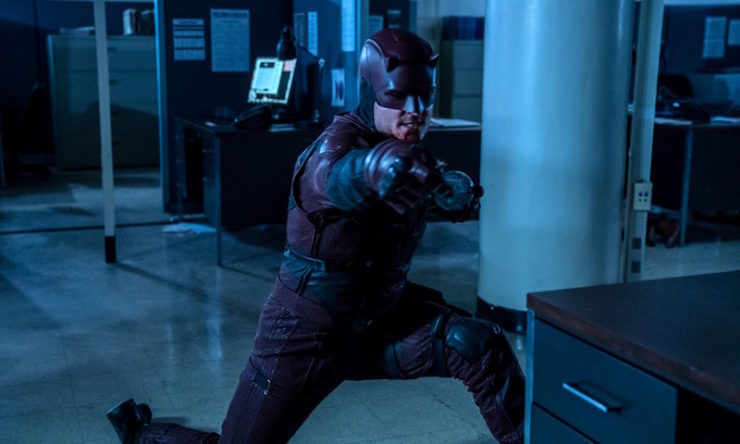
I am, personally, a fairly extreme pacifist. Maybe because of that, I LOVE fight scenes, and this season gives us two that easily match The Hallway Fight of season one, and then, in one long, no-cut, breathtaking, panic-inducing sequence, makes The Hallway Fight look like a brief argument at a youth group meeting. It never hits the level of gratuitous brutality in earlier seasons, and these three fights—with Bullseye; in a prison; and in a parking lot—show both how much Matt has improved as a fighter, and how dedicated he is to trying not to kill. Unlike in previous seasons where ninja death seemingly didn’t count, when he’s gratuitous in season three, he gets called on it.
One fight in particular was important to me, but it’s a little spoilery, so skip down four paragraphs if you want to avoid knowing anything about Episode Six, “The Devil You Know” (To make it easier, I’ll white out the spoilery text; highlight to read.)
Here’s an interesting thing: I saw the initial fight between bullseye and Daredevil as a setpiece at New York Comic-Con. In that context, and out of the show’s context, it was simply a masterful, breathtaking fight between two evenly matched people with very different fighting styles. Foggy steps into the room and watches as Bullseye pulls a knife out of a victim’s neck. Then Matt rescues Foggy, who runs into another room with Karen. The fight is amazing, but where they cut the scene it looked bad but not impossibly so. In context, however, we see Bullseye slaughter an entire roomful of journalists who are just sitting at their desks putting in their day of work.
You know, the thing I do in my office each day.
Then Matt barely saves his best friend, and gets his ass KICKED. Bullseye wounds Foggy and Ellison, murders Karen’s key witness, and leaves her untouched, physically, but terrified and implicated. Matt barely escapes.
It’s impossible to watch this scene and not think of attacks on real world newsrooms by real terrorists.
Character Arcs
Rahul Nadeem is an FBI agent put on Fisk detail. He shows us the economic side of the problem. He’s in debt up well past his eyeballs, his FICO score is a disgrace, and he’s been passed over for promotion for three years because he’s a “recruitment risk.” How did this happen? On the one hand, his sister-in-law’s health insurance rejected her when she got cancer, and he’s been paying her bills. On the other, he’s desperately trying to keep his family in the middle class suburban bracket they’re used to. His son is starting to notice that all of his friends have more stuff than he does, and his wife has had their credit card declined when she buys groceries. When he finally gets Fisk to talk, and flip on an Albanian crime syndicate, it looks like this could be the path out of crushing debt he’s been hoping for. Of course, with Fisk, things are never that simple—he’ll promise you anything you want, but he has his own agenda. He does not have your best interests at heart.
And yes, I said Albanians. Having worked through the Chinese, the Japanese, the Russians, the Irish, the Mexicans, and a non-racially-identified biker gang, the Albanians are the next crime syndicate to be vilified by Daredevil. (Assuming the show does come back for Season Four, I fear for the Norwegians and the Canadians. I think they’re all that’s left.)
The other major addition to the cast, FBI Agent Poindexter, shows us another part of society that’s been abandoned. Dex has had mental health issues his whole life, and lost his family at a young age, but unlike Matt Murdock he didn’t ever get the support network of loving nuns and Father Lantoms and best friends who would follow him over a cliff. He’s alone, left without the mental health care he needs, because it’s easier for people to look at the image of health and professionalism he projects rather than digging deeper. And so he continues to fall and flail into his illnesses with no net to catch him.
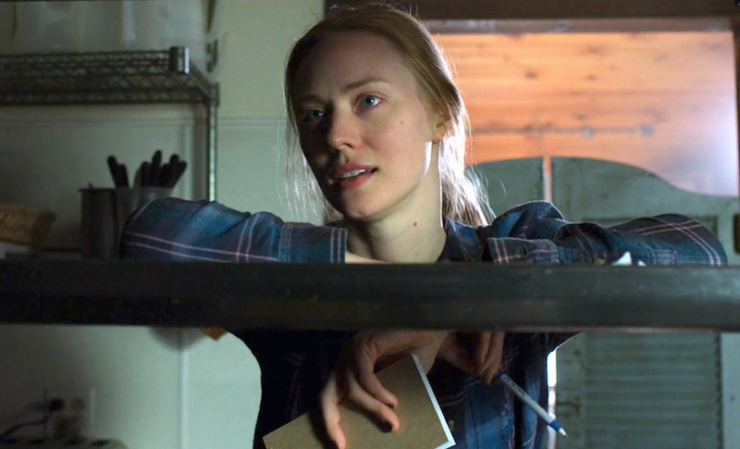
We finally see Karen’s origin story, in an episode that is worth the price of admission all by itself. The episode feels like it was imported from another show in the best way, because it gives us a version of Karen we’ve never seen. (It actually reminded me of “Git Gone” from American Gods’ first season.) While Matt and Sister Maggie argue endlessly over whether a person can change, Karen’s episode shows us that they absolutely can. It deepens her backstory, and more than pays off all the hints we’ve gotten—not in a gratuitous way (::cough::FrankMiller::cough::), but one that that gives all of Karen’s previous storylines more resonance. I actually went back and re-watched the Daredevil pilot just to track Karen’s character, and even then Deborah Ann Woll’s acting gave us flashes of what Karen had been and what she’d become. Her fight in season three with Fisk is emotionally rooted in what happened between her and Fisk’s right hand man, Wesley, back in the first season. She uses journalism right up to the moment it doesn’t work anymore, and then she goes for pure brute emotion in an astonishing scene between her and Fisk.
Foggy believes in the law. Freed of his need to play Matt’s sidekick, he uses his newfound confidence and sharp-ass suits to take on Blake Tower. Tower’s running for D.A., and caved to the Fisk deal, and Foggy goes after him like a good-natured bulldog,. He uses people’s tendency to underestimate him to the hilt, and it’s the first time we can see him really making it as a person outside of Matt’s sphere. (Plus Marcie’s back, and great, but she’s not in the show enough.)
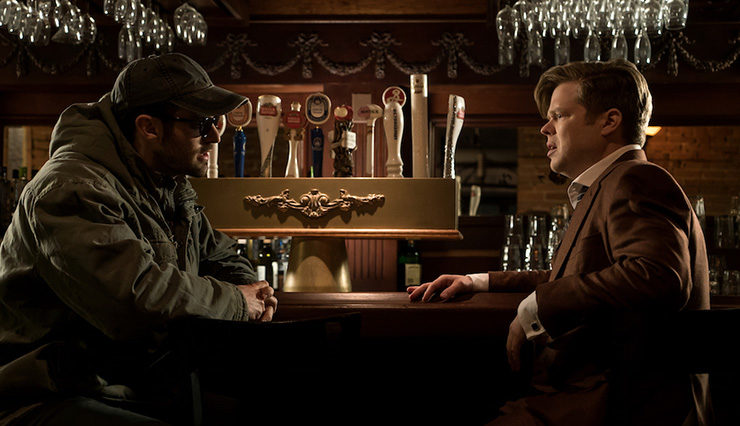
But here’s what makes the show great, aside from all the fights and emotional heart-to-hearts: Daredevil Season Three commits to the importance of fighting for good, even when the fight seems beyond hopeless, even after the heroes have lost and the villains have won on every front.
And at no point in the season does it ever, ever make that look easy.
It would have been easy to make a fun, action-oriented Daredevil season, to give us more Foggy quips and Matt being tortured about morality an an emo way. Instead, Matt’s spiritual despair is given real weight, and Foggy and Karen display more bravery and depth than even they’ve ever shown. It gives us complicated new villains and allies. It weaves in a long game argument about the value of art, culture, and education in the face of mobbed-up materialists. And at the center it shows us a furious, abused, abusive, blowhard autocrat who wants to feed the public lies and set neighbor against neighbor, all for his own financial gain and ego inflation. What the show does so beautifully is look at one giant problem—this autocrat—and follow each thread of the web he’s building. The heroes each fight in their own ways, and the show treats each battle as vital to the war. This isn’t just Matt Murdock: Tortured Hero for Free anymore. It’s Murdock and Page and Nelson and each street-level civilian who stands up against Fisk. The show gives us a fight that looks hopeless, and celebrates the fact that they all fight it anyway.
Leah Schnelbach just wants to hug Matt Murdock so hard by the end of this season, you can’t even imagine. Come join her in The Hallway Fight that is Twitter!










